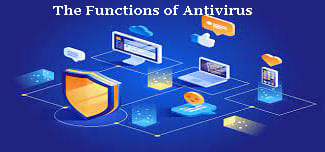Basic Functions of Antivirus Software

Antivirus software serves several basic functions to protect computer systems from malicious software (malware) and online threats. Here are the primary functions:
Real-time Scanning: Antivirus software continuously monitors files and activities on the computer system in real-time. It scans files as they are accessed, opened, executed, or downloaded to detect and prevent malware infections.
Malware Detection: Antivirus programs use various methods to detect malware, including signature-based detection and heuristic analysis. Signature-based detection involves comparing files against a database of known malware signatures, while heuristic analysis identifies suspicious behavior or characteristics that may indicate the presence of malware.
Quarantine and Removal: When antivirus software detects malware, it takes action to quarantine or remove the malicious files. Quarantining isolates infected files from the rest of the system to prevent further harm, while removal eliminates the malware entirely from the system.
Scheduled Scans: Antivirus software allows users to schedule regular system scans to proactively detect and remove malware. Scheduled scans can be configured to run at specific times or intervals, ensuring comprehensive protection without requiring manual intervention.
Automatic Updates: Antivirus programs rely on regularly updated databases of malware signatures to detect and combat new threats. Automatic updates ensure that the antivirus software has the latest definitions and capabilities to effectively protect against emerging malware threats.
Email and Web Protection: Many antivirus solutions offer email and web protection features to safeguard users from malicious email attachments, links, and websites. These features scan incoming and outgoing emails, as well as web pages, for potential threats and prevent users from accessing harmful content.
Firewall Integration: Some antivirus software includes firewall functionality to monitor and control network traffic. Integrated firewalls add an extra layer of security by filtering incoming and outgoing network connections, blocking unauthorized access, and preventing network-based attacks.
System Performance Optimization: Antivirus programs strive to minimize their impact on system performance while providing robust protection. They optimize resource usage, such as CPU and memory consumption, to ensure that the antivirus software operates efficiently without slowing down the computer system.
Overall, antivirus software plays a crucial role in protecting computer systems from malware infections and online threats by continuously monitoring, detecting, and neutralizing malicious software.
Thank you,